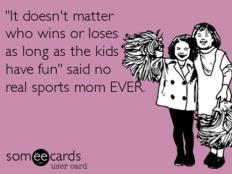Do Study the Best, Don't Overlook Greatness
In the 2010 NBA Finals, Los Angeles Lakers guard Kobe Bryant stated that he grew up studying tapes of basketball superstars. "I seriously have stolen all my moves from the greatest players," he said. Whether it was Magic Johnson, Oscar Robertson or Michael Jordan, Bryant watched numerous NBA games, looked for ways to imitate these great players, and incorporated their skills into his style of play. This is a great idea for young athletes. Kids can learn form, technique and work ethic from watching their favorite professional athletes.
Do Treat Success and Failure the Same, Don't Get Too Excited or Too Discouraged
A portion of Rudyard Kipling's poem "If" is written on the wall of the players' entrance to the Centre Court at the All England Lawn Tennis and Croquet Club, where the Wimbledon Championships are held. Before tennis legends take the court at one of the world's most famous stadiums, they must first pass by the following lines: "If you can meet with Triumph and Disaster And treat those two impostors just the same;". These lines are a reminder to athletes to keep a match or game in perspective, and remember to not get too elated when the game goes well, or too upset or discouraged when things go wrong.
Treating fame and famine the same way isn't easy. Sure winning is more fun than losing, but it's important for you as a parent to teach your son or daughter that playing sports isn't just about the outcome of the game. Encourage your young athlete to play hard, but remind your child that sports are supposed to be fun.
More: How to Motivate Your Young Athlete to Get Better
Do Focus on Yourself, Don't Blame Others
Teach your kids to take responsibility for their own actions, and remind them not to blame others for the outcome of a game. A dropped pass in football or a missed goal in soccer is not the deciding factor in a game. There are dozens of plays in every youth sport and all of them carry their own weight.
With this in mind, remind your kids that they should never blame others for a loss. Their teammate may have missed the game-winning shot, but it's not his fault that the team lost. Rather than blaming others, teach your kids to be supportive and encourage their teammates.
Parents sometimes struggle when it comes to blame and responsibility. For example, if a parent feels his or her child deserves more playing time, his or her first instinct may be to get mad at the coach. Instead of blaming the coach, a parent should spend time practicing with his or her child, and help him or her to improve and contribute to the team.
More: How to Help Young Athletes Learn From Mistakes
 Find your next family adventure.
Find your next family adventure.
- 2
- of
- 2









Discuss This Article